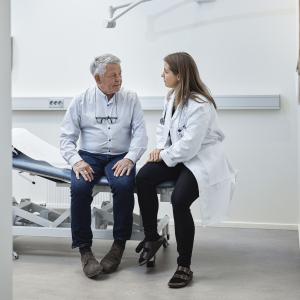CWRU School of Nursing awarded $2.56 million for age-friendly care program at MinuteClinic, the medical clinic inside select CVS Pharmacy locations
More than 1 million older adults have received “age-friendly” care since Case Western Reserve University’s Frances Payne Bolton School of Nursing partnered with MinuteClinic in select CVS Pharmacy locations to train nurse practitioners in its implementation in late 2018.
Beginning in 2018, grants of $850,000 and $2.44 million from The John A. Hartford Foundation launched the initiative, which uses evidence-based practices to assess patients aged 65 and older and offer care tailored to their specific needs. An additional $2.56 million grant, awarded last year, will allow CWRU researchers to measure the outcomes as CVS Health prepares to expand the program to other MinuteClinic services, such as behavioral health.
“This is a unique opportunity to not only ensure that older adults receive age-appropriate care, but also to evaluate the impact of Age-Friendly Health Systems using Medicare data,” said Mary Dolansky, PhD, RN (GRS ’01, nursing), the Sarah C. Hirsh Professor at the School of Nursing and the project’s principal investigator.
The project is part of the Age-Friendly Health Systems movement, created by The John A. Hartford Foundation and the Institute for Healthcare Improvement. It is based on the “4Ms framework”—What Matters, Medications, Mentation (mood and memory) and Mobility.
“The nurse practitioner [or physician assistant/physician associate] starts by asking the patient what matters to them, and it’s such a relationship builder,” Dolansky said. “Then they check medications because there is a long list of medications that are not safe for older adults; they evaluate cognitive status; and they observe how well the patient is functioning so they can suggest mobility aids when necessary to help prevent falls while keeping patients active.”
Using existing Medicare data from approximately 750,000 patients, the researchers will capture information from hundreds of millions of health records to continually improve delivery of care.
“Many of the health benefits of age-friendly care may come after the visit,” said Nicholas Schiltz, PhD (GRS ’13, epidemiology and biostatistics), an assistant professor at the School of Nursing and the project’s co-principal investigator. “So the patient receives the 4Ms screening—what happens after that? Do they follow up with their primary care physician? Are we catching new cases of depression and dementia? Are we avoiding emergency room visits and hospitalizations? This is the kind of data we’re looking at to demonstrate the long-term impact of the 4Ms framework.”
The unique academic-clinical partnership impacts approximately 1,000 clinics at select CVS Pharmacy locations nationwide through programming that includes virtual education for more than 2,800 providers. Anne Pohnert, DNP, RN (NUR ’23), MinuteClinic director of quality and co-principal investigator, will lead the expansion of the program, with other partners including the Institute for Healthcare Improvement and the Center for Clinical Informatics and Improvement Research at the University of California, San Francisco.
“MinuteClinic has been an excellent partner,” Dolansky said. “The practice believes it’s important to lead by example. As a national leader in the implementation of Age-Friendly Health Systems, we hope our efforts with MinuteClinic will inspire more providers to prioritize age-friendly care as their ‘north star.’ Older adults are a very vulnerable population, and we want to be the voice for improving their care.”
Originally published in the summer 2024 issue of Forward Thinking magazine


